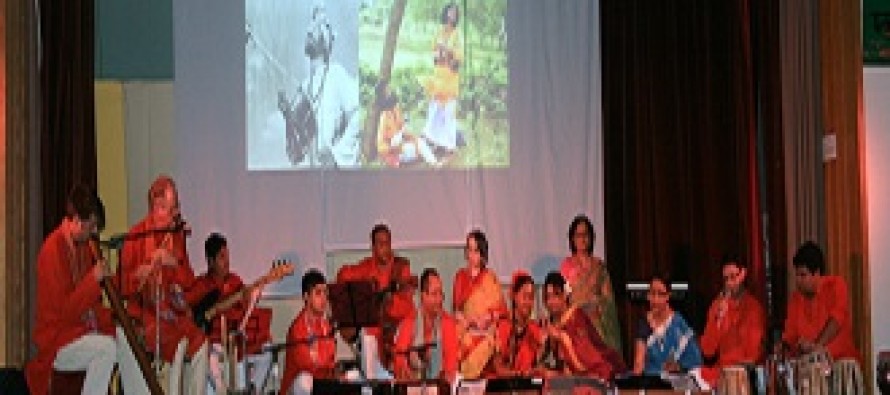Music and the promise of Dhrupad

A recent musical program by the group Dhrupad in Canberra brings into focus new ideas of music and its possibilities.
Music, a very ancient cultural activity, surpasses language, sports or indeed any other cultural activity in promoting universal human bonding. Evolutionary biology tells us that as soon as humans domesticated a plant (e.g., Lau or Gourd) they proceeded to make a musical instrument out of it (a tabla like drum or an ektara, giving widespread support to the song “Lauer aga khailam doga khailam….). With this instrument humans came out of Africa maybe 60-100 thousand years ago; and started to create music out of natural sounds, like hissing of leaves and sparkling sounds of falling water; and mixing them with existential sounds such as a meaningless lullaby of a mother or the random cooing of a baby. Distilled and organised essence of such sounds as we hear is music. But it is not enough to just hear them. In our brain there exists a music box, consisting of sound and melody neurons that interpret these sounds and convert them into a universal code of pitch and melody that we relate to.
It is important to think of music in this new light because of new developments in neurobiology which is giving a fresh meaning of the word culture. In this new interpretation culture is not some superfluous time wasting activity but tied to the very basic programs of human existence. Thus music plays an integral role in stimulating the brain and combating the effects of aging as brain cells are used to count pitch and melody during doing music and listening to music. Thus music is a therapy as well as part of integral human culture.

The Dhrupad program brought into focus folk music or the most ancient musical tradition of human race. From Biology we know that ancient humans came out of Africa with a very ancient musical instrument and travelled to Asia, crossing the North Asian Boering straight and eventually going to South America and via South East Asia came to Australia. It is very likely that a form of proto-music travelled with such human migration creating early human pathos and description of nature and linking it with human sense of self, love, grief, sense of divine etc. The folk musical traditions of different cultures, like our cultural DNA, are linked because of such common origin. Just like using DNA we can show common origin of all humans so it is that by delving into music of different cultures we can find areas of deep commonality. Such a search is meaningful not only as isolated events of national culture, but also for discovering a new universal culture bonded by music.
In a very simple way Dhrupad, the musical group based in Canberra, Australia has started this journey by presenting folk music of two ancient land, Bangladesh and Australia. Our folk music came out of the lifestyle and tradition of our adivasi or aboriginal people, later impacted on by other forms of music. But the direct cry to nature for water, love, a very simple form of divine entity; such music shows a form of early universalism that we have now lost.
In the Dhrupad such lyrics were linked with didgeridoo one of the most ancient musical instrument. Saxophone, Tabla, Guitar were all used in unison along with the didg to create a sound synergy.
This is probably the first time Australian and Bangladeshi musical traditions were juxtaposed in a creative way. It created a cultural space where our two countries can meet and exchange ideas. Historically music has been presented as isolated ethnic and national activity, surrounded by walls of tradition. But as we learn more and more about the commonality of human origin direct activities showing such linkages becomes of immense importance. The Dhrupad program was attended by numerous people of non-Bangladeshi origin; hopefully this trend will continue.
We live in a world increasingly divided by ethnic and religious strife. People are becoming increasingly restless, scared, by these developments. Music soothes the mind, makes the brain work, and brings into light things that are noble in human mind. If we can use such an activity to create new linkages of humans; it could be a charter for the future. Dhrupad has attempted to bring in this enterprise young ones of several cultures. It is a beginning of a long fruitful journey.
People of the Bengal delta in the past have shown energy for human universalism; we are not just about ethnic and linguistic identity; in us we harbour attributes of all humans. I hope in future the new effort displayed by Dhrupad in Canberra will open a flood gate of cultural mingling. New music for a new world that is what we need now.





